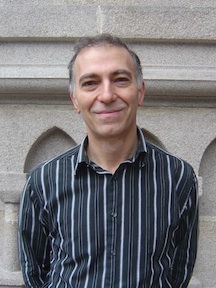By Hailey Austin
Jeffrey Hause, professor of philosophy and Classical and Near Eastern studies at Creighton University, was named Nebraska’s U.S. Professor of the Year for 2015.
The U.S. Professors of the Year program salutes the most outstanding undergraduate instructors in the country—those who excel in teaching and positively influence the lives and careers of students. Sponsored by the Council for the Advancement and Support of Education and the Carnegie Foundation for the Advancement of Teaching, it is the only national program to recognize excellence in undergraduate teaching and mentoring.
All undergraduate teachers in the United States, of any academic rank at any type of undergraduate institution, are eligible for the award. Entries are judged by top U.S. educators and other active participants in education.
Hause, who became a member of Phi Beta Kappa at the University of California, Los Angeles in 1982, was nominated by the university to apply for the award, whose stipulations require applicants to answer questions about excellence in the classroom, pedagogy, and teaching contributions to the community as well as to the university.
As the director of the Honors Program, secretary of the Phi Beta Kappa chapter at Creighton University, board member of the Center for Undergraduate Research and Scholarship, member of the Faculty Senate and Council of Chairs, Hause was more than qualified for nomination. However, when he was notified by e-mail that he had received the award, he thought it was a joke. “I thought the date for announcing winners had passed,” said Hause. “Somebody’s playing a practical joke on me.”
Humbled by the experience, Hause was quick to mention the countless other professors who should have received the award. “At first it felt embarrassing because I’m surrounded by so many very fine scholars and teachers it’s hard to understand what justifies the choice of me as an award winner,” said Hause. At the awards ceremony, however, he discovered almost all of the recipients felt the same way.
Hause remains amazed by receiving the U.S. Professor of the Year award but is excited for what it means for his fields of study. “I’m very proud for my field,” he said. “I’m very pleased that they were willing to give an award to someone who specializes in medieval philosophy—something that doesn’t get a lot of attention.”
While he was featured in the Creighton University Newsletter and attended an awards ceremony in Washington, D.C. with the other state and national winners, Creighton’s students and faculty have long recognized Hause as an extraordinary teacher and mentor.
“Many of Dr. Hause’s students are the ones who are in love with learning and who see their education as a way to ask and explore ‘the big questions,’” Bridget Keegan, dean of the College of Arts and Sciences, told the Creighton News Center. “They are drawn to Dr. Hause as a guide and mentor on their journey.”
“Having visited his class, I know why,” she explained. “He has an amazing gift, a distinct style in the classroom, that can take the most complex and difficult concepts and — without ever oversimplifying — make them accessible and relevant.”
As Hause himself was quick to mention, he is not the only Creighton professor to receive this prestigious award. He is Creighton’s third consecutive Nebraska Professor of the Year recipient, with Psychology Professor Matthew Huss winning in 2013 followed by English Professor Greg Zacharias in 2014.
The process of applying for the award, more than actually winning it, has helped Hause in the classroom. “Applying for the award helped me to be more intentional and methodical in planning and structuring classes,” he said. Hause continues to put his students first by making sure they continue to pursue “the big questions” and are fully engaged in the learning process.
Hailey Austin is a senior at Creighton University majoring in English and Spanish with a minor in history. Creighton University is home to the Beta of Nebraska Chapter of Phi Beta Kappa.




